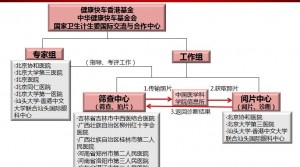(April 11, 2014 – Beijing) The Chinese Foundation for Lifeline Express held a ceremony today at the Peking Union Medical Hospital to launch Phase 1 of the Diabetic Retinopathy Screening pilot project. Among the guests attending the ceremony were Mr. Huang Jiefu, former Vice-Minister of the Ministry of Health, Mrs. Nellie Fong, Founding Chairman of Lifeline Express Hong Kong Foundation, and representatives from project sponsors Li Ka Shing Foundation and Hutchison Whampoa Limited. Also in attendance were a panel of experts and the initial batch of photographers and readers from the screening and grading centres.
During the ceremony, Mr. Huang, Mrs. Fong, and Mr. Dong Fangtian, Director of the Ophthalmology Department at Peking Union Medical Hospital, shared their views on the significance of the project and awarded certificates for three photographing centres, three readers, and eight screening centres.
Studies in recent years have shown that China has one of the largest numbers of diabetes patients among all nations. Every year approximately one million diabetes patients lose their eyesight owing to lack of proper medical treatment. It is estimated that approximately 15 million people will lose their eyesight because of diabetes by 2025. Of great concern is the lack of public awareness that diabetes can cause blindness, and once eyesight is lost, it cannot be recovered. This project aims to raise awareness and encourage more people to undergo screening so they can receive the proper early treatment if necessary.
In addition to a contribution of HK$6 million from the Li Ka Shing Foundation and Hutchison Whampoa, the project is supported by China’s National Health and Family Planning Commission, in collaboration with the Lifeline Express Hong Kong Foundation and the Chinese Foundation for Lifeline Express. Prior to the start of the project, Professor David Wong of the Li Ka Shing Faculty of Medicine at the University of Hong Kong had already trained three readers who are now internationally qualified. The project is also supported by the Peking Union Medical Hospital, Peking University Third Hospital, and the Shantou University/ Chinese University of Hong Kong Joint Shantou International Eye Centre.

